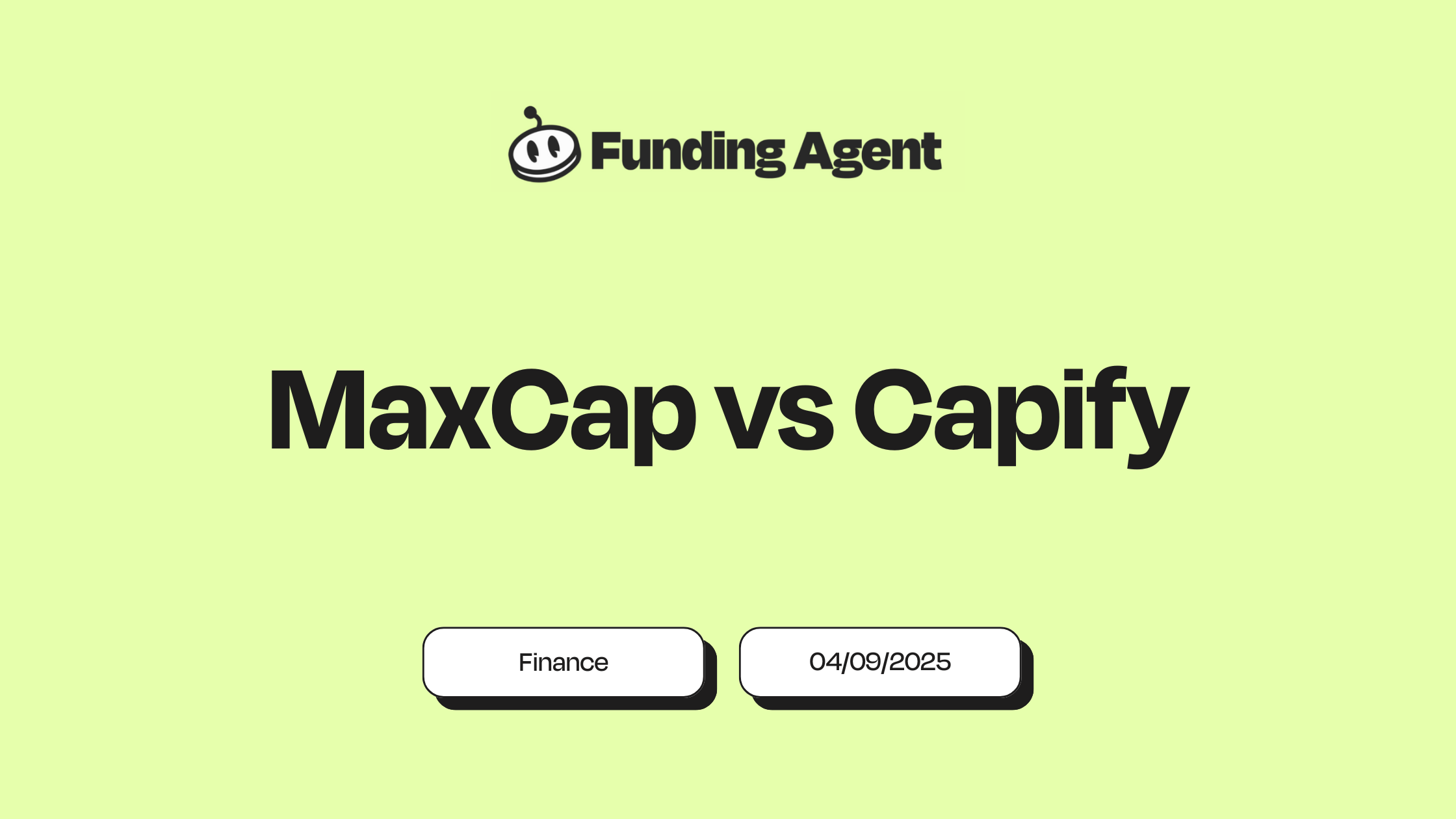

MaxCap vs. Capify: Which Lender Is Right For Your Business?

For many UK SMEs, securing finance is no longer about waiting weeks for a bank to decide. Alternative lenders can deliver funds in days, sometimes hours. Two names that often come up are MaxCap and Capify. Both have carved out strong reputations in the UK market, but they differ in products, loan sizes, repayment structures, and eligibility. This guide follows our detailed comparison format and expands on every metric you need to make an informed choice.

MaxCap vs Capify: Visual Comparison Dashboard
Choosing the right business finance partner often comes down to the details, from loan amounts and repayment terms to revenue thresholds and product flexibility. This interactive dashboard breaks down the key metrics of MaxCap and Capify side by side, showing how much you can borrow, what turnover you need to qualify, how repayments may affect cash flow, and which products best fit different turnover bands. Use the tabs to explore each dimension and quickly spot the strengths and trade-offs between the two lenders.
Company Overview
MaxCap launched in 2020 and is registered in London (Companies House). It positions itself as a digital-first lender with a focus on speed and unsecured funding. Industry profiles on Capalona and Rangewell list it as a flexible option. The firm also engages with brokers through the NACFB Expo.
Capify has a longer track record. Founded in 2008, it rebranded in 2015 and also operates in Australia (Wikipedia). Capify has secured a £75m funding facility from Goldman Sachs (AltFi), which supports its ability to fund larger loans. Independent reviews such as NerdWallet UK point to its broad product range and higher maximum lending, while also flagging the potential for higher costs compared to banks.
Products and Loan Structures
MaxCap offers one product: the Unsecured Business Loan. Loan amounts range from £5,000 to £350,000, terms are 3–12 months (sometimes 18), and repayment can be daily, weekly, or monthly. No debenture is taken, though a personal guarantee is required. Early repayment discounts reduce the overall cost.
Capify has a wider set of products. Its Unsecured Loan ranges from £5,000 to £1m, its Merchant Cash Advance offers up to £3m repaid as a cut of card sales, and its Secured Loans go up to £3m with property security. Terms are 3–12 months for unsecured, flexible for MCA, and up to 5 years for secured loans.
Loan Sizes and Terms
MaxCap: £5k–£350k, terms of 3–12 months, flexible repayment schedules. Loans are structured for short-term needs and cash flow management.
Capify: £5k–£1m unsecured, up to £3m secured or MCA. Terms are 3–12 months unsecured, flexible for MCA, and up to 5 years secured. Its higher upper limits give it an edge for larger SMEs.
Worked Examples
Capify Loan Example: A £30,000 unsecured loan at a factor rate of 1.20 = £36,000 repayable. Spread over 12 months, repayments equal £3,000 per month or £692 per week. The cost is fixed and known from day one.
Capify MCA Example: A £60,000 advance with a 12% holdback. With £100,000 monthly card sales, £12,000 is repaid that month. If sales fall to £70,000, repayment drops to £8,400. Flexibility is high, but timing to repay is less predictable.
MaxCap Loan Example: A £50,000 loan with £57,000 total repayable over 12 months = £4,750 per month. If repaid at month 9, early settlement discounts save thousands.
Another MaxCap Example: A £20,000 loan over 6 months has £22,400 repayable. That’s £3,733 per month. Paying off at month 5 may save £600–£800 in charges.
Costs and Fees
Neither lender publishes APRs. Data from UK Finance shows unsecured SME loans often fall between 20%–60% APR. Rangewell reports MaxCap charges arrangement fees of 0.5–5%. Capify FAQs confirm it uses factor rates, meaning a fixed total repayable. Early settlement is allowed by both; MaxCap offers discounts, Capify does not reduce the total but may allow early payoff.
Eligibility and Requirements
MaxCap: 12+ months trading, £15k monthly turnover, 6 months of bank statements, ID, and a personal guarantee. Sole traders are accepted without a homeowner requirement.
Capify: 12+ months trading. For loans, £10k monthly turnover; for MCA, £20k card revenue. Requires 12 months of statements, ID, landlord details, and a personal guarantee. Sole traders must show £25k turnover and be homeowners. According to UK Parliament SME statistics, about half of SMEs turn over less than £250k annually, so Capify’s £10k/month rule may be more accessible than MaxCap’s £15k/month rule.
Customer Experience
MaxCap reviews: 4.8/5 from 120+ clients, with 94% five-star. Praised for quick decisions and flexible repayment.
Capify reviews: 4.4/5 from 650+ clients, about 90% positive. Praised for supportive account managers, with some complaints about declines and follow-up calls. NerdWallet UK also highlights the higher cost trade-off for flexibility.
Comparison Table
How to Compare These Offers
When comparing MaxCap and Capify, request a full cost breakdown. Focus on total repayable, not just the monthly figure. Check how early repayment works. Ask about fees for refinancing. Look at document requirements and funding speed. Consider whether a fixed repayment or revenue-linked model better matches your business cycle. For wider guidance, see FSB resources.
Key Takeaways
MaxCap is a newer lender offering simple unsecured loans up to £350k with flexible repayments and early pay discounts. Capify is more established, provides larger loans up to £3m, and offers Merchant Cash Advances linked to card sales. MaxCap suits SMEs with stable turnover who want cost savings for early settlement, while Capify fits firms needing higher sums or repayment models tied to revenue.
Which Lender Fits Best?
MaxCap works best for SMEs with steady turnover above £15k per month, who want a simple unsecured loan and the chance to save by repaying early. It suits businesses confident in cash flow who prefer fixed structures with some flexibility.
Capify suits firms needing larger sums, more product choice, or repayment tied to card sales. It is particularly useful for retail, hospitality, and seasonal businesses where sales vary month to month. Its broader product set makes it attractive to SMEs seeking tailored solutions beyond a standard loan.
Which Lender Should You Choose?
Both MaxCap and Capify offer SMEs a way to bypass slow bank lending. MaxCap is the simpler choice for short-term loans with flexible repayment and savings on early payoff. Capify stands out for scale, product range, and MCA options that flex with sales. The right choice depends on your turnover, documentation, and repayment preference. Always compare the total repayable before committing. For independent advice and access to a panel of lenders, visit Funding Agent or begin your application with the Funding Agent form.
.png)

